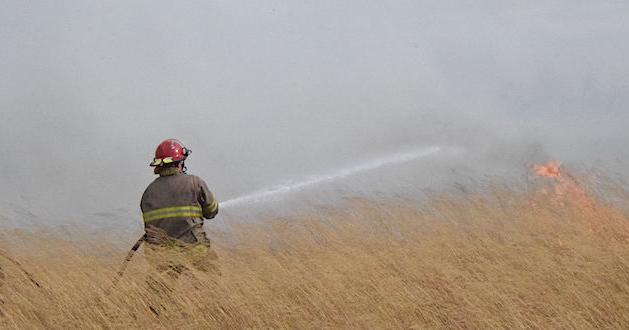A new county-wide, quarter-cent sales tax would be a shot in the arm for Comanche County’s smaller communities and have a huge impact on the county’s volunteer fire departments.
But it also would take the City of Lawton’s sales tax rate to one of the highest in the state.
Eddie Dabney made the pitch for a new sales tax to members of the Comanche County Industrial Development Authority (CCIDA) last week, outlining a concept he has argued for more than a decade. Revenues from that quarter-cent tax would benefit three groups: rural fire departments, which would receive 20 percent of the revenue; CCIDA, which would receive 40 percent; and the county’s nine small towns, which would receive 40 percent.
It’s an idea that is intriguing to CCIDA. Members have mixed feelings as they balance the effects of a higher total tax against the dramatic loss of revenue the entity suffered when its share of the existing county sales tax was cut in 2021 when voters approved a new sales tax. Chairman Paul Ellwanger said CCIDA lost about 80 percent of its funding, going from $800,000 a year to about $180,000 a year.
“We fund economic development,” Ellwanger said of CCIDA’s role in bringing new jobs to Comanche County while also supporting those already here. “We’ve never declined a request from a municipal or county entity in the 20 years I’ve been involved with it.
“We have challenges now.”
Dabney, noting he is making the proposal as a citizen of Comanche County rather than a bank executive, said the idea is to improve small towns by giving them money to grow while also helping those who own property in rural areas by increasing the abilities of volunteer fire departments. His proposal is centered around the revenues produced by the new quarter-cent tax (categories funded by the existing tax remain the same). After analyzing the sales tax revenue generated by the existing county sales tax in 2022, Dabney estimated the new quarter-cent tax would generate an average of $329,023.87 per month.
Dabney said the revenue increase for volunteer firefighters is important because it would allow those departments to grow and upgrade equipment. That, in turn, provides better fire protection and improves ISO ratings. Better ISO ratings mean lower insurance rates for those who own structures outside Lawton. While Lawton has a Class 1 rating (the highest), everyone else in the county has a lower rating, meaning they pay higher premiums.
Allocating 40 percent of the new revenue to Cache, Chattanooga, Elgin, Faxon, Fletcher, Geronimo, Indiahoma, Medicine Park and Sterling would boost spending in those communities. Dabney said revenues would be spent on “what those communities feel is best.” The CCIDA proposal would restore a revenue stream to an entity created specifically to grow jobs, he said.
“You can’t do that any more,” Dabney said, explaining CCIDA’s loss is hampering its work. “You will have money to work with.”
“Again,” said CCIDA member Karol Haney.
“Again,” Dabney agreed.
CCIDA members noted the potential effect of the tax on volunteer fire departments and communities at large. Tami Morefield, vice president of All America Bank in Cache, said that is important for Cache.
“We are as low as we can get,” she said of Cache’s Class 3 rating, adding Cache can’t move to Class 2 without adding three or four full-time firefighters. “We don’t have the funding at this time.”
Dabney said Cache would, with what he estimated would be $35,534.58 more each month from the new tax. Dabney also said the new revenue would help more rural areas by giving them a revenue stream to stimulate economic growth.
“The entire county wants to grow,” he said.
That’s important, said Haney, explaining that as someone involved in economic development and education, she has been asked what other communities can do to reverse their decline. She said some towns are dying because they have no revenue, at a time when some families are looking to smaller school districts because they don’t their children in large schools.
“Cache Public Schools has a great reputation, but some people want to transfer to smaller schools,” Haney said of the potential for smaller towns to grow as families move their children into smaller school settings.
Authority members acknowledge the benefits of the new revenue stream, but are concerned about how a higher tax rate would be received.
“Any time you talk increases in taxes is emotional,” said Ellwanger, adding that at a total of 9 percent, Lawton’s sales tax rate already is one of the highest in the state. Adding a quarter cent would make that difference even more dramatic.
Authority members also remain angry about the change in allocation approved in 2021, which they said was changed at the last minute without their input. That’s why CCIDA member Fred Fitch said authority members will be involved in this process.
“I’m firm about this: we are involved in every step,” Fitch said, adding members don’t want the funding allocation “changed at the last minute when it goes to a vote of the people.”
Members recommended Dabney go to rural communities and explain what the tax means, something Dabney already plans to do. He also has spoken to county commissioners. District 1 Commissioner John O’Brien and District 3 Commissioner Josh Powers attended Thursday’s CCIDA meeting, but did not make any comments on what Powers said was the advice of their attorney.
Dabney said the strength of his proposal is that funding goes to smaller communities, while Morefield said data shows those communities will support the tax if they realize a benefit.
“This is the only way some money goes back,” Dabney said. “It’s their decision what to do with their money.”
CCIDA member George Moses said he has concerns beyond the higher tax rate, in light of what he believes will happen to the national economy.
“Man, we’d better be careful,” he said.
Want to reach a local audience and grow your business?
Our website is the perfect platform to connect with engaged readers in your local area.
Whether you're looking for banner ads, sponsored content, or custom promotions, we can tailor a package to meet your needs.
Contact us today to learn more about advertising opportunities!
CONTACT US NOW




